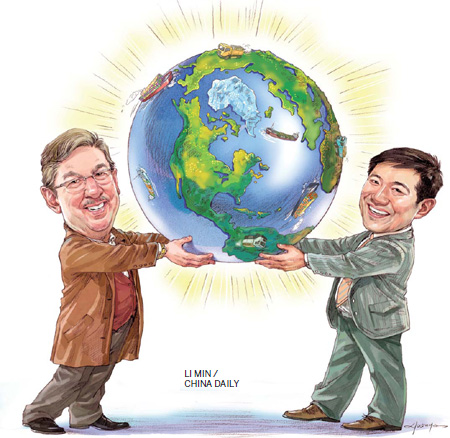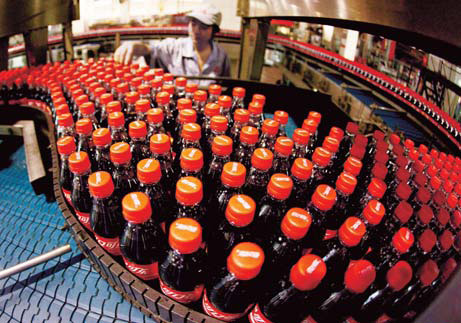A world of difference
Updated: 2011-12-09 08:37
By Ding Qingfen (China Daily)
|
|||||||||||

In past decade, China has developed into an economic powerhouse, but benefits have spread throughout the globe
"Objectively speaking, as a company doing foreign trade in the agricultural sector, we felt huge pressure from China's accession to the WTO, (World Trade Organization)" said Jiang Hua, a COFCO (China Oil & Foodstuffs Corporation) board member.
China entered the global trade organization in late 2001 after 15 years of negotiations with all WTO members. Agriculture was the most difficult part of the final negotiations.
Under the deal, China agreed to loosen restrictions on agricultural imports. "We had concerns the business would be hurt, as the market opened and everyone could take part in the agro-import business," Jiang said.
So what happened?
After Ning Gaoning became chairman of the board in 2004, COFCO witnessed a transformation. Through a series of nationwide M&As (mergers and acquisitions), the corporation went from importing and exporting agro goods to covering a whole chain of businesses, from commodities and food processing, to logistics and sales.
"We made strategic adjustments, and we tried to find the best aspects of WTO membership to help us grow stronger," Jiang said. "See what change happened at COFCO." In 2010, COFCO's sales revenue had surged 5.5 times on the figures in 2001 to $138.6 billion, and total assets had grown 4.5 times to $232.6 billion.
During this period, COFCO also entered into partnerships with many foreign brands, including Coca-Cola and Wilmar, Asia's leading agribusiness group. "We aim to build the company into a brand providing Chinese consumers with a variety of daily foods", Jiang said. "Over the next decade, COFCO will add muscle to its overseas investments."
COFCO's case shows how Chinese industries and companies were motivated to benefit from WTO membership, rather than be taken advantage of by foreign competitors, as many observers had expected.
When China joined the WTO, many people were worried that less-developed sectors - such as agriculture, retail, finance and the automotive industry - would be squeezed out by foreign competition.
"We used to say 'the wolves (foreign companies) are coming, what should we do?' But the fact is Chinese companies have grown much stronger in the past decade as several batches of foreign companies came to China", said Sun Zhenyu, former Chinese ambassador to the WTO. "We grew with them."
Take the auto industry. Although it was listed as one of the most vulnerable sectors at the time of China's accession to the WTO, it "witnessed active, comprehensive, and deep-rooted changes," according to Zhou Qiang, a member of the Party committee of Dongfeng Motor Corporation.
During the past 10 years, China's auto output has increased eightfold, enjoying annual growth of 24.3 percent, and its sales had surged to 18.26 million units in 2010, from a mere 2.07 million in 2001.
China grows
In 1986, China notified the General Agreement on Tariffs and Trade (GATT) of its wish to regain its status as a GATT contracting party. GATT was transformed into the WTO in 1995.
By regaining its status, China hoped to implement its opening-up policy, which was launched in 1978, and to become involved in global economic cooperation more effectively, said Li Zhongzhou, a former member of the Chinese delegation to the WTO negotiations.
The decade-long evolution proves that China achieved its aims. In that time, China's exports grew by a factor of 4.9 and imports by 4.7, helping the nation grow into the world's largest exporter and its second-largest importer.
China's foreign direct investment (FDI) hit a record high of $100 billion in 2010, and its accumulative FDI from 2001 to 2010 reached more than $1.1 trillion. China is the second-largest FDI destination in the world and the largest among developing nations.
China climbed to become the fifth-largest overseas direct investment (ODI) nation in 2010, with the figure reaching $60 billion, from less than $1 billion 10 years ago.
"China did not break its promise," said Premier Wen Jiabao at the opening ceremony of China's 110th Canton Fair in Guangzhou in October. "It has implemented its commitment to the WTO since its entry into the global trade organization. China's entry helped the nation improve its competitiveness and it created real benefits worldwide."
As agreed with WTO members, China lowered import tariffs, removing non-tariff measures including import quota and licenses, and reducing restrictions for foreign companies.
China reduced its tariffs on average from 15.3 percent before 2001 to 9.8 percent by 2010, far below the level of developing nations. China opened more than 100 service sectors, including banking, telecom and securities, which brought it close to the level of developed nations.
"The biggest change since China became a member of the WTO has been the nation's rapid economic rise," said Long Yongtu, the former vice-minister of foreign trade and economic cooperation and one of the four heads of China's delegation to the WTO negotiations.
"This growth surprised the world, and it has even gone beyond Chinese expectations."
China's GDP surged to 40 trillion yuan ($6.29 trillion) in 2010, from 11 trillion yuan in 2001, making the nation the world's second-largest economy. It was the sixth-largest in 2001.
Even the sectors that many feared could be threatened by the influx of foreign companies witnessed remarkable growth. China became the third-largest agricultural trading nation, increasing its trade 3.4 times to $122 billion in 2010.
Service sectors, including insurance, banking and telecommunications, increased in total assets by factors of 10, three and six.
"The threat was not as serious as many thought," Long said. "In banking and insurance, market share for foreign companies in China is below 5 percent," said Long. "Opening-up has been very positive for China."
According to He Zhenlin, vice-president of Sany Group Co Ltd, China's accession made it possible for the company to stand out and become fully internationalized. Sany is China's leading engineering machinery provider.
"We imported quite a lot of quality components at reasonable prices, creating the most advanced pump motor in the world," said He.
|
A Coca-Cola bottling plant in Beijing. The company plans to invest another $4 billion in China over the next three years. [Photo / Xinhua] |
World benefits
"China's market prosperity has brought huge benefits for other nations," said Pascal Lamy, director-general of the WTO.
In the past 10 years, China annually imported goods worth $750 billion on average, which translated into more than 14 million jobs.
In 2010, the United States exported goods worth $92 billion to China, 4.5 times the amount in 2001. Brazil's exports to China were worth $31 billion in 2010, compared with $2 billion in 2001.
In 2008, China became the largest destination for exports from the least-developed nations, according to the WTO.
Premier Wen said in Guangzhou that "made-in-China goods have helped US consumers save expenditure worth $600 billion in the past 10 years, and each European family spent 300 euros ($420) less every year".
Growth since 2001 is not only about exports and imports. From 2001 to 2010, profits of foreign companies in China increased by 30 percent on an annual basis, and their cumulative profits were $261.7 billion in that period.
"US companies reaped fat profits from China's entry (to WTO), and they now have more access to join the market and grow with it," said Robert Poole, vice-president of the US-China Business Council's China Operations.
"Restrictions on foreign companies have been gradually removed," Long said. "We can see the remarkable contributions made by foreign companies."
Wal-Mart, the world's largest retail chain, had opened 339 supermarkets in 124 Chinese cities by the end of June, creating 95,000 jobs.
Coca-Cola, the world's largest soft-drinks company, announced in August another $4 billion investment in China over the next three years, building upon the $3 billion investment announced in 2009.
Since 1978, absorbing foreign investment has been a national policy for China. "For a long time, foreign businesses have enjoyed many preferential policies, which has helped them grow rapidly," said Sun Weimin, vice-chairman of Suning Appliance Co Ltd, China's leading retailer of household appliances.
Despite the global benefits created by China's economic growth, it has been frequently been challenged and rebuked.
As its exports recorded annual double-digit growth, China has been a major target of trade protectionism.
As a condition to its entry into the WTO, China agreed that its market economy status (MES) would not be recognized internationally until 2016, and this has been a major cause of regular trade remedy cases against China.
From 2001 to 2010, other nations lodged 12 trade remedy cases against Chinese exports, and "trade frictions will continue to rise as China's position as the largest exporter cannot be challenged in the short term", Sun said. "We have to prepare for that."
Next decade
"China will continue to implement the opening-up policy, learning from foreign nations and improving its economic and political system", Wen said.
In its 12th Five-Year Plan (2011-2015), China pledged to promote imports, balance its trade and reduce trade frictions with other nations. In the next five years, China's imports will "exceed $8 trillion, meaning more opportunities worldwide," Wen said.
However, some regions, including the US and the EU, still control high-tech exports to China. "We expect them to loosen the restrictions and recognize China's MES as soon as possible," Wen said.
China will also continue to encourage more foreign companies to expand business in China as it urges local companies to invest overseas, according to Wen.
In 2010, some foreign companies raised a wave of attacks against China's foreign investment environment, describing it as "deteriorating" and referring to issues such as intellectual property rights, government procurement and market access.
However, during the past year the nation has taken measures and revised rules to make the investment environment more favorable.
"China has made substantive progress in opening up the market, making it more transparent. And the country is more confident about opening further," said Long.









